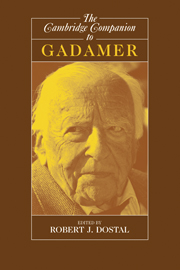Book contents
- Frontmatter
- Introduction
- 1 Gadamer
- 2 Gadamer’s Basic Understanding of Understanding
- 3 Getting it Right
- 4 Hermeneutics, Ethics, and Politics
- 5 The Doing of the Thing Itself
- 6 Gadamer on the Human Sciences
- 7 Lyric as Paradigm
- 8 Gadamer, the Hermeneutic Revolution, and Theology
- 9 Hermeneutics in Practice
- 10 Gadamer’s Hegel
- 11 Gadamer’s Relation to Heidegger and Phenomenology
- 12 The Constellation of Hermeneutics, Critical Theory, and Deconstruction
- Bibliography
- Index
3 - Getting it Right
Relativism, Realism, and Truth
Published online by Cambridge University Press: 28 May 2006
- Frontmatter
- Introduction
- 1 Gadamer
- 2 Gadamer’s Basic Understanding of Understanding
- 3 Getting it Right
- 4 Hermeneutics, Ethics, and Politics
- 5 The Doing of the Thing Itself
- 6 Gadamer on the Human Sciences
- 7 Lyric as Paradigm
- 8 Gadamer, the Hermeneutic Revolution, and Theology
- 9 Hermeneutics in Practice
- 10 Gadamer’s Hegel
- 11 Gadamer’s Relation to Heidegger and Phenomenology
- 12 The Constellation of Hermeneutics, Critical Theory, and Deconstruction
- Bibliography
- Index
Summary
Is there a conception of reality that can be rationally justified independently of the standpoint of the persons whose conception it is? Such a conception has sometimes been referred to as an “objective” or “absolute” conception of reality, and philosophers such as Bernard Williams and Thomas Nagel think we can find it among the most advanced and secure truth-claims of the natural sciences.
Nowadays, however, it seems more common to hear philosophers deny that there are any absolute conceptions of reality, even in the natural sciences. Every theoretical advance, they point out, has a “history” that conditions and thus “relativizes” the truth of the position advanced. Traces of such histories can be seen in the contingent changes in the conceptual languages in which truth-claims are put forth. For example, Hilary Putnam recently reminded us that even terms such as “electron” can have a conceptual history that changes with the historically shifting context of research. What makes this fact problematic for traditional notions of objectivity is that such notions usually insist that the objects of research or the referents of terms such as “electron” or “genes” are what they are independent of our conceptual vocabulary. This creates the expectation that we ought somehow to be able to compare the adequacy or accuracy of any conceptual vocabulary against the object itself. But if we have no way to locate such referents independently of those same vocabularies and, moreover, if those vocabularies are subject to change (even seemingly random and unpredictable change), then where, it is often asked, are we to find the fixed, concept-independent object?
- Type
- Chapter
- Information
- The Cambridge Companion to Gadamer , pp. 52 - 78Publisher: Cambridge University PressPrint publication year: 2002
- 15
- Cited by

